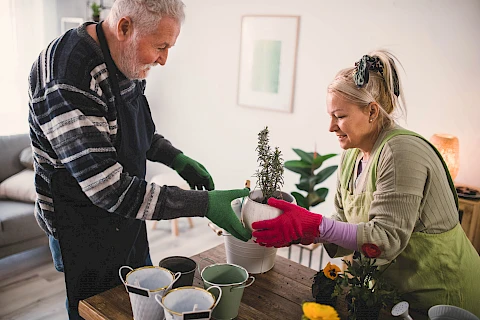
Gardening doesn't have to be limited to the outdoors. Indoor gardening can be a wonderful and soothing activity. Therapeutic activities like indoor gardening are incredibly beneficial for senior well-being. Discover tips on setting up and maintaining an indoor garden, insight into its mental and physical health benefits, and ways to involve seniors in the gardening process.
Benefits of Indoor Gardening for Seniors
Indoor gardening provides a host of benefits for seniors, touching on mental, physical, and cognitive well-being.
Mental Health
It can significantly boost mental health by reducing stress and anxiety, creating a calming environment, and enhancing mood and emotional well-being. Gardening provides a sense of purpose and accomplishment, giving seniors something to look forward to each day.
Physical Health
Physically, indoor gardening improves motor skills and coordination. The light physical activity involved can be a gentle yet effective workout, promoting better sleep and overall energy levels. It gets seniors moving, which is vital for their physical health.
Cognitive Well-Being
Indoor gardening stimulates various cognitive functions. It can help seniors with memory and encourage problem-solving skills. Figuring out the needs of different plants requires various levels of attention and thought, keeping the mind active and engaged.
Setting Up an Indoor Garden
Getting started with an indoor garden is easier than you might think.
- Choose Low-Maintenance Plants: Select low-maintenance plants that thrive indoors, such as spider plants, pothos, and succulents. These plants are hardy and don't require extensive care, making them ideal for beginners.
- Gather Essential Supplies: Pots and containers, good quality soil, and fertilizers are the main supplies you'll need. Basic gardening tools such as small trowels, watering cans, and pruning shears will also be helpful. These supplies are usually available at local gardening stores or online.
- Set Good Lighting and Temperature: Most indoor plants need natural light, so setting them near windows can be beneficial. Additionally, make sure the gardening area is safe and accessible. Use sturdy tables and easy-to-reach shelving for placing plants.
Tips for Maintaining an Indoor Garden
Proper watering techniques are critical for maintaining your indoor garden. Most indoor plants prefer the soil to dry out a bit between waterings rather than being constantly wet. Use appropriate fertilizers to give your plants necessary nutrients, sticking to feeding schedules recommended for each plant type.
Basic pruning helps keep the plants healthy. Trim off any dead leaves or branches to allow new growth. Regularly monitor plant health, looking for signs of pests or disease. Address any issues promptly to prevent them from worsening.
Ideas for Involving Seniors in the Gardening Process
To make indoor gardening even more engaging, include seniors in various parts of the process. Involve them in the planning stage, asking for their preferences in plants and flowers. Discussing different types of plants and their attributes can pique their interest.
Let seniors take part in hands-on activities like potting and repotting plants. Decorating pots and the garden space with them can make the process more enjoyable and personalized. Consider group gardening projects, which can be a social activity. Sharing gardening experiences and tips can foster a sense of community and belonging.
Get Gardening Assistance From Senior Helpers
Indoor gardening offers numerous mental, physical, and cognitive benefits for seniors. By setting up a simple, accessible indoor garden and involving seniors in the process, caregivers can provide a rewarding and therapeutic activity.
If you're interested in starting an indoor garden for the seniors in your care, don't hesitate to contact us at Senior Helpers Phoenixville for more information and support. We are here to assist families from Phoenixville, Pottstown, Malvern, and throughout Montgomery County.